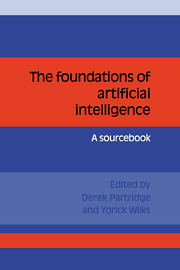Book contents
- Frontmatter
- Contents
- List of contributors
- Preface
- Acknowledgments
- 1 Introduction
- 2 The formal foundations of AI
- 3 Levels of theory
- 4 Programs and theories
- 5 The role of representations
- 6 The role of programs in AI
- 7 Rational reconstruction as an AI methodology
- 8 Is AI special in regard to its methodology?
- 9 Does connectionism provide a new paradigm for AI?
- 10 The role of correctness in AI
- 11 Limitations on current AI technology
- The challenge of open systems
- Towards a reconciliation of phenomenology and AI
- The superarticulacy phenomenon in the context of software manufacture
- 12 Annotated bibliography on the foundations of AI
- Index of names
The challenge of open systems
Published online by Cambridge University Press: 03 May 2010
- Frontmatter
- Contents
- List of contributors
- Preface
- Acknowledgments
- 1 Introduction
- 2 The formal foundations of AI
- 3 Levels of theory
- 4 Programs and theories
- 5 The role of representations
- 6 The role of programs in AI
- 7 Rational reconstruction as an AI methodology
- 8 Is AI special in regard to its methodology?
- 9 Does connectionism provide a new paradigm for AI?
- 10 The role of correctness in AI
- 11 Limitations on current AI technology
- The challenge of open systems
- Towards a reconciliation of phenomenology and AI
- The superarticulacy phenomenon in the context of software manufacture
- 12 Annotated bibliography on the foundations of AI
- Index of names
Summary
Systems of interconnected and interdependent computers are qualitatively different from the relatively isolated computers of the past. Such “open systems” uncover important limitations in current approaches to artificial intelligence (AI). They require a new approach that is more like organizational designs and management than current approaches. Here we'll take a look at some of the implications and constraints imposed by open systems.
Open systems are always subject to communications and constraints from outside. They are characterized by the following properties:
Continuous change and evolution. Distributed systems are always adding new computers, users and software. As a result, systems must be able to change as the components and demands placed upon them change. Moreover, they must be able to evolve new internal components in order to accommodate the shifting work they perform. Without this capability, every system must reach the point where it can no longer expand to accommodate new users and uses.
Arm's-length relationships and decentralized decision making. In general, the computers, people, and agencies that make up open systems do not have direct access to one another's internal information. Arm's-length relationships imply that the architecture must accommodate multiple computers at different physical sites that do not have access to the internal components of others. This leads to decentralized decision making.
Perpetual inconsistency among knowledge bases. Because of privacy and discretionary concerns, different knowledge bases will contain different perspectives and conflicting beliefs. Thus, all the knowledge bases of a distributed AI system taken together will be perpetually inconsistent. Decentralization makes it impossible to update all knowledge bases simultaneously.
- Type
- Chapter
- Information
- The Foundations of Artificial IntelligenceA Sourcebook, pp. 383 - 395Publisher: Cambridge University PressPrint publication year: 1990
- 14
- Cited by



